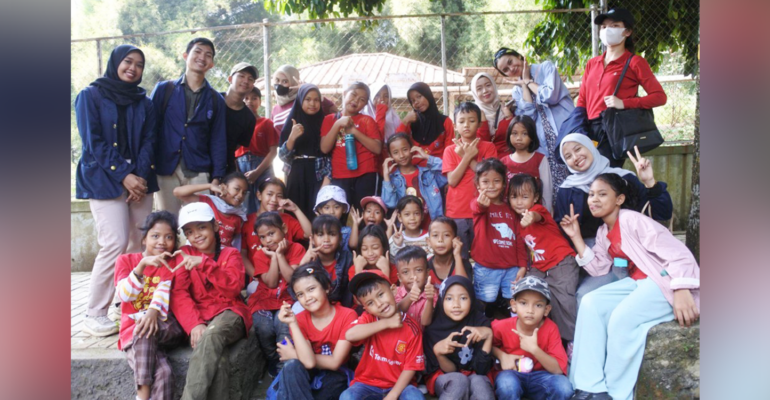PKM PM IPB University Team ‘B-Rangers Street’ Strengthens Talent Interest for Marginalised Children in Bogor City

Marginalised children are commonly children who have limitations from various aspects such as environmental, economic, and social.
For this reason, IPB University’s Student Creativity Programme for Community Service (PKM PM) team ‘B-Rangers Street’ implemented a talent interest strengthening programme for marginalised children around Terminal Baranangsiang, Bogor City, especially those who are members of the Save Street Child (SSC) community.
The team was led by Rahmat King Abd. Azis Zainuddin with members Rizik Akbar Affandi, Dwi Hardika, Maulidhita Fawwaza and Nurmareta Istiqomah, and mentored by Dr Eva Rachmawati. They raised the big theme of the importance of strengthening interests and talents. The passion-based approach was used to improve the children’s quality of life.
“Every child has uniqueness and natural potential, the biggest challenge is how to develop it into interests and talents. The children in the SSC community in Bogor City are also unique to me. Many of them have abilities and potential in various fields such as art, science, and sports,” said King, the student team leader.
However, he continued, economic limitations and the absence of a forum to develop their interest in a field are obstacles. “This is why our team wants to collaborate with SSC Bogor City,” he said.
Save Street Child is a community concerned about the condition of street children in big cities such as Jakarta, Bogor, Bandung, Malang and Surabaya. This community was initiated by Shei Latiefah, who since 13 years ago established a forum for youth to do community service, especially street children.
Based on the results of interviews with IPB University students with the SSC teaching team in Bogor City, there are currently six teachers with a vulnerable age of 19-25 years. The lack of various resources is one of the obstacles, and the methods used tend to be monotonous, resulting in a lack of participation from the children.
King explained that the Passion-based Approach method used is based on the Asset Based Community Development (ABCD) principle. This method is often used as an innovation and strategy in sustainable community empowerment. It is based on assets, strengths, and potentials that are owned so that capacity building and responsibility can be created to improve the quality of life from various aspects.
Since April, a number of programmes have been implemented. Starting from the preparation of learning media, programme implementation to monitoring and evaluation. The team also compiled a guidebook for programme implementing partners. The strengthening of the programme is also based on knowledge, attitudes and skills.
“Since the programme began, there has been an increase in knowledge related to interests, talents and the importance of pursuing goals from an early age. In terms of attitude, there has been an increase in self-confidence, responsibility, discipline, and perseverance,” said King.
“Of course, strengthening attitudes is very important for marginalised children, so that they are able to develop their interests and talents,” he added.
The skills trained also showed significant development. There are five passion classes, including writing, science, dance, sports and drawing.
“We hope this programme can bring positive changes to marginalised children and the environment in which they live. Their activities will be more positive than having to play in the Baranangsiang Terminal area which is prone to negative impacts on children,” he hoped.
He also mentioned that the programme is expected to be continued by organisations that have worked with the team, the National Population and Family Planning Agency (BKKBN) and the Bogor City Social Service. (*/Rz) (IAAS/RUM)



